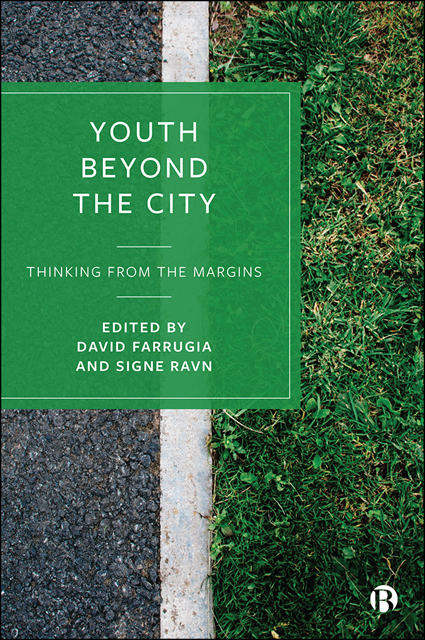Book contents
- Frontmatter
- Contents
- List of Figures and Tables
- Notes on Contributors
- Introduction: Thinking from the Margins
- Part I Inequalities: Education and Aspiration on the Margins
- Part II Materialities: Spatiality and Sensory Embodiment
- Part III Identities: Mobility, Rootedness and Belonging
- Part IV Temporalities: Historicizing Space and Place
- Index
3 - Becoming a Young Organic Farmer in the Indian Punjab
Published online by Cambridge University Press: 13 October 2022
- Frontmatter
- Contents
- List of Figures and Tables
- Notes on Contributors
- Introduction: Thinking from the Margins
- Part I Inequalities: Education and Aspiration on the Margins
- Part II Materialities: Spatiality and Sensory Embodiment
- Part III Identities: Mobility, Rootedness and Belonging
- Part IV Temporalities: Historicizing Space and Place
- Index
Summary
Introduction
A 2019 article in The Independent reported on a group of young farmers in Ghana who call themselves the ‘agripreneurs’. Most of these youth had high levels of education but limited prior experience in agriculture. They sought to mobilize what they had gained through education – knowledge and business acumen – in scientific, high-tech agricultural ventures with profitable business models. These youth emphasized the need to attract other young people to agriculture, given the country's dependence on imported food, its ageing farmers and problems of youth unemployment – and they believed their model of farming could show others the way. ‘We have to show people farming is bling!’ one of the ‘agripreneurs’ told the reporter (Nir, 2019).
The views of the ‘agripreneurs’ reflect an emerging discourse on youth in agriculture in the global south, articulated by governments, business, the media, transnational institutions and civil society. Over the last decade, a suite of government schemes in countries across Asia, Africa, Latin America and the Caribbean have sought to enlist youth as active participants in the agricultural sector. Often mobilizing positive images of the personal and economic benefits of agricultural entrepreneurship, such programmes encourage youth to become leaders in agricultural innovation and sustainability and seek to stem social problems such as the ageing of farmers, rural youth unemployment and unsustainable rates of rural– urban migration (see Rigg et al, 2020). International donors such as USAID (2019) and the International Fund for Agricultural Development have sought to sponsor projects to harness young people's supposed disposition towards entrepreneurship and high-tech farming by removing obstacles to accessing land, technology and credit. Multinational agribusiness has also been involved in constructing this ‘youth in agriculture’ discourse: Bayer's biennial ‘Youth Ag Summit’, held in locations across the world, showcases youth working on global agricultural challenges.
Yet, these programmes face a problem – often framed in terms of ‘aspiration’. In short, young people do not want to become farmers. An emerging body of research suggests that youth are leaving agriculture due to the low social status and poor economic returns that accrue to farming (Tadele and Gella, 2010) and a sense of disempowerment resulting from their lack of control over the means of agricultural production (White, 2012).
- Type
- Chapter
- Information
- Youth beyond the CityThinking from the Margins, pp. 57 - 74Publisher: Bristol University PressPrint publication year: 2022

